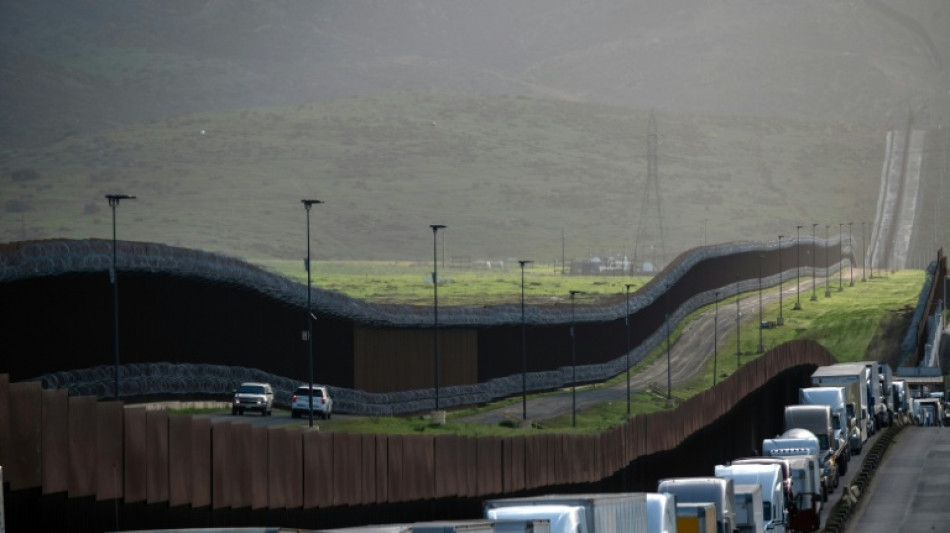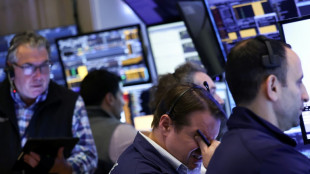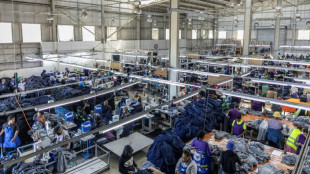
| RYCEF | 0.2% | 9.8 | $ | |
| RBGPF | -0.41% | 67.72 | $ | |
| CMSC | -1.18% | 22.238 | $ | |
| SCS | -5.14% | 10.9 | $ | |
| BCC | -6.05% | 96.245 | $ | |
| BP | -7.49% | 31.455 | $ | |
| BTI | 3.59% | 41.75 | $ | |
| RIO | -1.35% | 59.105 | $ | |
| GSK | 2.88% | 38.755 | $ | |
| NGG | 5.24% | 69.42 | $ | |
| JRI | -1.26% | 12.878 | $ | |
| RELX | 1.41% | 51.71 | $ | |
| BCE | 2.09% | 22.285 | $ | |
| CMSD | -1.09% | 22.584 | $ | |
| VOD | 2.72% | 9.375 | $ | |
| AZN | 3.27% | 74.665 | $ |

On Mexico-US border, Trump's 'Liberation Day' brings fears for future
As dawn broke over the Mexican-US border on US President Donald Trump's "Liberation Day," Raul Hernandez steered his semi-trailer carrying Toyota pick-up trucks towards California, worried how tariffs would affect him.
If Trump goes ahead with his plan to impose sweeping import duties and manufacturers move their plants to the United States, many workers in Mexico will suffer, he said.
"A lot of people are going to lose their jobs here if he does that," the 37-year-old told AFP, waiting in a long queue to cross into San Diego.
Factories operated by foreign companies are vital for Mexican border cities like Tijuana and the armies of workers who keep them running, Hernandez said.
"They provide jobs. They support families. If the plants really stop because of tariffs, it will hurt Mexico and the Mexican people," he added.
Behind him in the queue, Omar Zepeda was also transporting Tacoma pick-up trucks from a nearby Toyota plant.
Like Hernandez, he was nervous about the impact of tariffs.
"I think there will be a lot less work for us because the products will become more expensive and fewer people will buy them," the 40-year-old said.
"There's a reason why the plants are here. Maybe the people who work here are more efficient and the labor is cheaper."
- 'Difficult times' -
Mexico's northern industrial borderlands are home to thousands of factories thanks to tax breaks and free trade agreements dating back several decades.
"Most of the families in Tijuana work in factories and transportation," Zepeda said.
"It's very uncertain. We don't know what's going to happen," he added. “I think difficult times are coming, but let's wait and see."
Taking a break from his work at the Toyota plant on the outskirts of Tijuana, Apolos Vela said tariffs would deal a heavy blow across the city.
"It is worrying because it would mean that many people would be left without jobs ," he said.
- 'Tragic for Tijuana' -
In Mexican border cities like Tijuana, where poverty and crime are a part of everyday life, it is not just factory and haulage workers who rely on cross-border trade worth hundreds of billions of dollars a year.
Selling burritos to hungry truckers at her roadside stall next to the border fence built to keep out undocumented migrants, Charito Moreno said tariffs would hurt all of Tijuana if plants fire workers.
"Everyone depends on those businesses. The week the tariffs were introduced, many people took time off, and that's why the economy is slowing down," the 44-year-old said.
If companies heed Trump’s call to relocate from Mexico to the United States, "it would be tragic for Tijuana, because many workers would be left without jobs," Moreno said, urging the two countries to come to an agreement.
Jumping out of his truck carrying parts for swimming pools in the United States to grab a burrito, Antonio Valdez said truckers already had more paperwork to deal with.
"A procedure used to take an hour. Now it takes all day to calculate and pay taxes," he said before leaping back into his truck to head to the border.
Mexican President Claudia Sheinbaum said Wednesday she was working on a wide-ranging program of economic reforms in response to the tariffs.
"It's in our interest to strengthen the Mexican economy," she said.
Trucker Alejandro Espinoza said Mexico should hit the United States where it hurts.
"If they impose tariffs on us, we won't send them avocados and see what they do then," he said with a chuckle.
O.F.MacGillivray--NG



